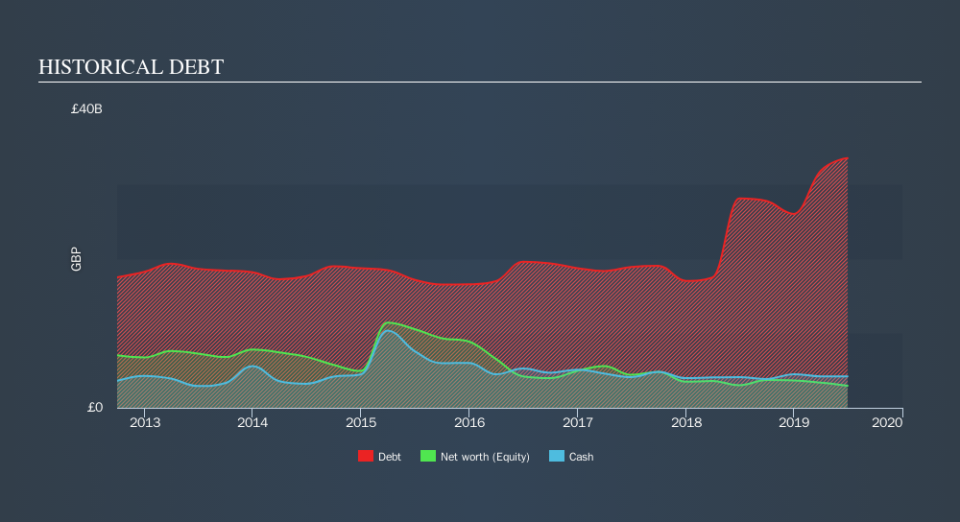Here's Why GlaxoSmithKline (LON:GSK) Can Manage Its Debt Responsibly

Some say volatility, rather than debt, is the best way to think about risk as an investor, but Warren Buffett famously said that 'Volatility is far from synonymous with risk.' When we think about how risky a company is, we always like to look at its use of debt, since debt overload can lead to ruin. We note that GlaxoSmithKline plc (LON:GSK) does have debt on its balance sheet. But the real question is whether this debt is making the company risky.
What Risk Does Debt Bring?
Debt is a tool to help businesses grow, but if a business is incapable of paying off its lenders, then it exists at their mercy. Part and parcel of capitalism is the process of 'creative destruction' where failed businesses are mercilessly liquidated by their bankers. However, a more common (but still painful) scenario is that it has to raise new equity capital at a low price, thus permanently diluting shareholders. Having said that, the most common situation is where a company manages its debt reasonably well - and to its own advantage. The first step when considering a company's debt levels is to consider its cash and debt together.
See our latest analysis for GlaxoSmithKline
What Is GlaxoSmithKline's Net Debt?
You can click the graphic below for the historical numbers, but it shows that as of June 2019 GlaxoSmithKline had UK£33.4b of debt, an increase on UK£28.1b, over one year. However, because it has a cash reserve of UK£4.21b, its net debt is less, at about UK£29.2b.
How Healthy Is GlaxoSmithKline's Balance Sheet?
Zooming in on the latest balance sheet data, we can see that GlaxoSmithKline had liabilities of UK£25.8b due within 12 months and liabilities of UK£34.9b due beyond that. Offsetting this, it had UK£4.21b in cash and UK£7.06b in receivables that were due within 12 months. So it has liabilities totalling UK£49.4b more than its cash and near-term receivables, combined.
This deficit is considerable relative to its very significant market capitalization of UK£81.2b, so it does suggest shareholders should keep an eye on GlaxoSmithKline's use of debt. This suggests shareholders would heavily diluted if the company needed to shore up its balance sheet in a hurry.
We use two main ratios to inform us about debt levels relative to earnings. The first is net debt divided by earnings before interest, tax, depreciation, and amortization (EBITDA), while the second is how many times its earnings before interest and tax (EBIT) covers its interest expense (or its interest cover, for short). This way, we consider both the absolute quantum of the debt, as well as the interest rates paid on it.
GlaxoSmithKline's net debt is 2.7 times its EBITDA, which is a significant but still reasonable amount of leverage. However, its interest coverage of 10.2 is very high, suggesting that the interest expense may well rise in the future, even if there hasn't yet been a major cost attached to that debt. If GlaxoSmithKline can keep growing EBIT at last year's rate of 13% over the last year, then it will find its debt load easier to manage. The balance sheet is clearly the area to focus on when you are analysing debt. But it is future earnings, more than anything, that will determine GlaxoSmithKline's ability to maintain a healthy balance sheet going forward. So if you're focused on the future you can check out this free report showing analyst profit forecasts.
Finally, while the tax-man may adore accounting profits, lenders only accept cold hard cash. So it's worth checking how much of that EBIT is backed by free cash flow. Over the most recent three years, GlaxoSmithKline recorded free cash flow worth 79% of its EBIT, which is around normal, given free cash flow excludes interest and tax. This cold hard cash means it can reduce its debt when it wants to.
Our View
The good news is that GlaxoSmithKline's demonstrated ability to convert EBIT to free cash flow delights us like a fluffy puppy does a toddler. But, on a more sombre note, we are a little concerned by its level of total liabilities. All these things considered, it appears that GlaxoSmithKline can comfortably handle its current debt levels. Of course, while this leverage can enhance returns on equity, it does bring more risk, so it's worth keeping an eye on this one. We'd be motivated to research the stock further if we found out that GlaxoSmithKline insiders have bought shares recently. If you would too, then you're in luck, since today we're sharing our list of reported insider transactions for free.
If, after all that, you're more interested in a fast growing company with a rock-solid balance sheet, then check out our list of net cash growth stocks without delay.
We aim to bring you long-term focused research analysis driven by fundamental data. Note that our analysis may not factor in the latest price-sensitive company announcements or qualitative material.
If you spot an error that warrants correction, please contact the editor at editorial-team@simplywallst.com. This article by Simply Wall St is general in nature. It does not constitute a recommendation to buy or sell any stock, and does not take account of your objectives, or your financial situation. Simply Wall St has no position in the stocks mentioned. Thank you for reading.

 Yahoo Finance
Yahoo Finance 
